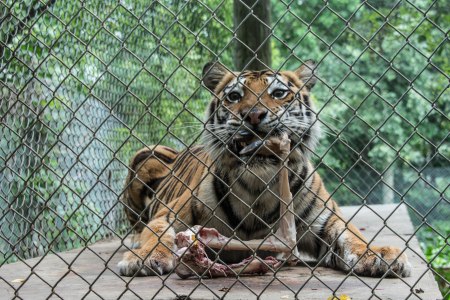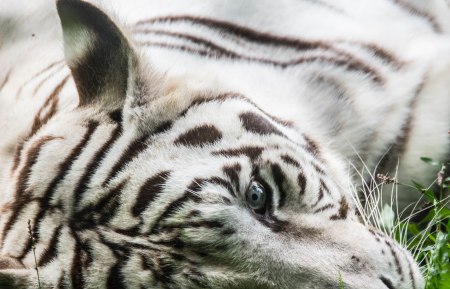Big cats and human complexity
This weekend I spent time at the Exotic Feline Rescue Center near Brazil, Indiana. Most of the cats at the Center are tigers, due in part to the popularity of tiger ownership as a status symbol, as well as the obsession with breeding white tigers. Such breeding inevitably produces many non-white tigers, which then require sanctuary.
There really are very few places that one can get so close to big cats; in the wild it’s unwise, and in zoos there always seem to be greater physical barriers, whether through glass or moats or just sheer distance. The EFRC keeps the cats in wooded, fenced habitats. Some of the cats are quite affectionate, and would come up and rub their faces against the fence when our guide called them, just like ordinary kitties.
 Others, though, behaved very much like one would expect wild tigers and lions to behave. I stood in front of one tiger who was enjoying a deer bone, and was quite unperturbed by my presence as he gnawed gruesomely on the hoof. I admit, gruesome or not, I found this thrilling to watch. These tigers were enormous creatures, 500 pounds of pulsing muscle, and yet still graceful on the paw, leaping up on their boxes, and jumping back down again.
Others, though, behaved very much like one would expect wild tigers and lions to behave. I stood in front of one tiger who was enjoying a deer bone, and was quite unperturbed by my presence as he gnawed gruesomely on the hoof. I admit, gruesome or not, I found this thrilling to watch. These tigers were enormous creatures, 500 pounds of pulsing muscle, and yet still graceful on the paw, leaping up on their boxes, and jumping back down again.
I watched in fascination as one tiger meticulously groomed his paw with a tongue that looked as big as a raw pot roast. There is no understating the gravitas of these beasts; I was left speechless, and could only thank God or the universe that something so great lives in the world.
One enclosure housed a lioness and a huge male tiger who had lived happily together since they were cubs. I liked these inter-species companions very much. Perhaps, I thought, we can live together after all.
I went back into the human world on Monday, and went about my business, still thrilled by these enormous wild cats with their own personalities and quirks. Facebook, as usual, was the purveyor of all manner of outrages, and I saw that one involved a lion that had been shot and decapitated in Zimbabwe. I couldn’t click on it just then, with the memory of these cats so fresh in my mind. But it was a viral story, and by the end of today I knew the details without ever having read an article. So I read one to make sure I had the facts, and yes, Cecil was a popular, friendly, human-oriented lion who’d beenshot by an American trophy hunter. And all across my Newsfeed, I saw people united in horror and outrage. Left and right, men and women, Democrats and Republicans, all religions, all stripes — all were horrified by Cecil’s fate and the rapacious hunter who killed him.
For my part, I felt Cecil’s story in my gut, and it hurt. But intellectually, I knew that people were never so united in outrage when the habitat of these big cats was disappearing; when the numbers of tigers in the wild plummeted to dangerously low levels. Why now, with this one lion? In some ways, that’s just a function of how human beings are galvanized to action. We all respond to a story, and to personal acquaintance. And people got this story.
For me, Cecil’s death is like an avatar for what we’ve done to wildlife in the course of my lifetime. Around my birthday last year, the London Zoological Society reported in its Living Planet Index that since 1970 — the year of my birth — fully 40% of wildlife populations had been decimated. A life can be measured in so many ways, but that was the most sobering. In the time I’d been alive, so much of value had been extirpated. How many of these huge, muscled cats had drawn their last breath with each successive birthday?
Cecil’s story also reminded me, yet again, of the paradox of humanity. Human beings killed this lion for fun. Other human beings dedicate their lives to offering sanctuary to them.
Outrage is a quick-burning fuel, so I hope that this one gets harnessed to blow up some greater truths in the larger human awareness. Killing these animals for pleasure and sport is repulsive, to be sure. But other wildlife is no less dead, just because it was collateral damage to human expansion.

No comments:
Post a Comment